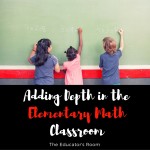People often assume that we are well-versed in “all things” education as teachers. Teachers are taught to differentiate instruction for Advanced Students, Struggling Students, English Language Learners, and Students with Special Needs. Over the years, teachers have learned how to meet the needs of students, but we have more to learn. I have had many diverse students, including those with special needs, but having a child with neurological diversity myself is a whole new world I had no idea how to navigate.
I have been in dozens of Individual Educational Program (IEP) meetings, but I was not prepared for being on the other side in the parent role. My husband and I did hours of research, tapped into our network of Special Education (SPED) Educators. We struggled to learn a system that did not seem to be set up to help parents understand the intricate, and often unfair and inequitable, nature of having a child with special needs. When the pandemic hit, our struggles were exacerbated by many issues that were out of our control.
We continued our fight for the right for our son to have a Free Appropriate Public Education (FAPE) and for the services in his IEP to be adhered to. We are constantly aware and thankful for the many privileges we have: a two-parent household, jobs, supervisors, and administrators who understand and support our fight, accommodating teachers and friends who are SPED advocates and other resources. But what about the parents and students who are not so fortunate? Our hearts go out to all Neurological Diverse Students and their parents. With so many problems in education, not limited to but including staffing shortages, Covid Outbreaks, and continual shifts to distance education, who will speak up for them?
“California is behind when it comes to inclusion rates for students with special needs,” says Senator Cortese, who serves on the Senate Education Committee. “This bill [SB 692] will reimagine how to provide specialty and high-quality education to meet the needs of all students.”
SENATOR DAVE CORTESE INTRODUCES THE “SPECIAL EDUCATION INCLUSION ACT” WITH THE SANTA CLARA COUNTY OFFICE OF EDUCATION, 24 Feb. 2021)
The saddest part about the constant fight special needs parents have is that there is already legislation on the books that focus on students with special needs in education. So, the failure to ensure parents know their rights and implement services students have is against laws already in place. But, if you are not aware of the rules, do not understand the laws, and have no financial means to hire advocates or lawyers to fight to make sure the laws are followed, who is there to speak up when those rights are violated?
“SACRAMENTO – Senator Scott Wilk, representing the 21st Senate District, announces Senate Joint Resolution 8 (SJR 8) has unanimously passed the Senate. SJR 8 urges the United States Congress to uphold its end of the bargain and fully fund the Individuals with Disabilities Education Act (IDEA), a program focusing on disabled students.
“All California students should be provided a quality education – it is one of the state’s highest priorities – but the federal government has not given us its promised share of the special education funding we badly need,” said Wilk. “This forces our schools to do more with less, which hurts all students, whether or not they have special needs.”
Senate approves Wilk measure supporting special education, 19 June 2019
Schools have always been forced “to do more with less,” and SPED programs, classes, and teachers are no exception. What happened to the alleged “pandemic purse” that was supposed to infuse education with monies to handle anything and everything the schools needed to help educate our students? Why are there staffing shortages in nearly every school, including classroom aides, one-on-one aides, and therapists? Why are the needs of Neurological Diverse Students seemingly seen as “less of a priority” when the services are denied are essential to their education now more than ever? Why aren’t the current laws being enforced?
“In 2004, Congress went even further and enacted the IDEA Act, which set a minimum of 40 percent federal fund-matching for the average per-pupil expenditure in public elementary schools and secondary schools to pay for services for children with disabilities. That Act has yet to be fully funded.”
Senate approves Wilk measure supporting special education, 19 June 2019
The SPED Acts had “yet to be fully funded” pre-pandemic, so how much is not allocated during this pandemic? When we think about the learning loss of students during distant learning, are we also specifically considering the academic, social and developmental learning that is being lost with Neurological Diverse Students? When parents are protesting for in-person learning to ensure that their student’s mental health is being considered, are they thinking about how important this is to students with special needs? When districts tell us, they are not authorized by counties and states to move to distance learning when outbreaks occur, are the political figures who make these decisions in education thinking about the mental and physical health and safety of Neurological Diverse Students? When teachers have to be absent due to exposure, positive cases, or illness due to Covid, and the school has to move students to other classrooms, are they thinking about how important structure and consistency is to Neurological Diverse Students?
During my limited research, I have learned many lessons. The fight for students with Special Needs rights has been going on for decades. Some laws were meant to help these students but appear to have stalled on policy floors. Many issues seem to have been put on the back burners and far as priorities in education, and unfortunately, special education is one of them. So, what do we do? Continue to be the voice for the voiceless. Continue to educate other parents as we learn information ourselves. Continue to advocate for those who may not have the time, financial means, and possibly even energy left to fight.
“Through words, he gave voice to the voiceless. Through deeds, he gave courage to the faint of heart” (Barack Obama).
Our “deed” is to make sure the education system does not continue to put the needs of Neurological Diverse Students to the side but that they are seen as a priority. We must employ every platform to speak up for the injustice of ignoring students with special needs who deserve just as much attention as all students struggling in this flawed system of education. If not us, then who will speak up for them?






